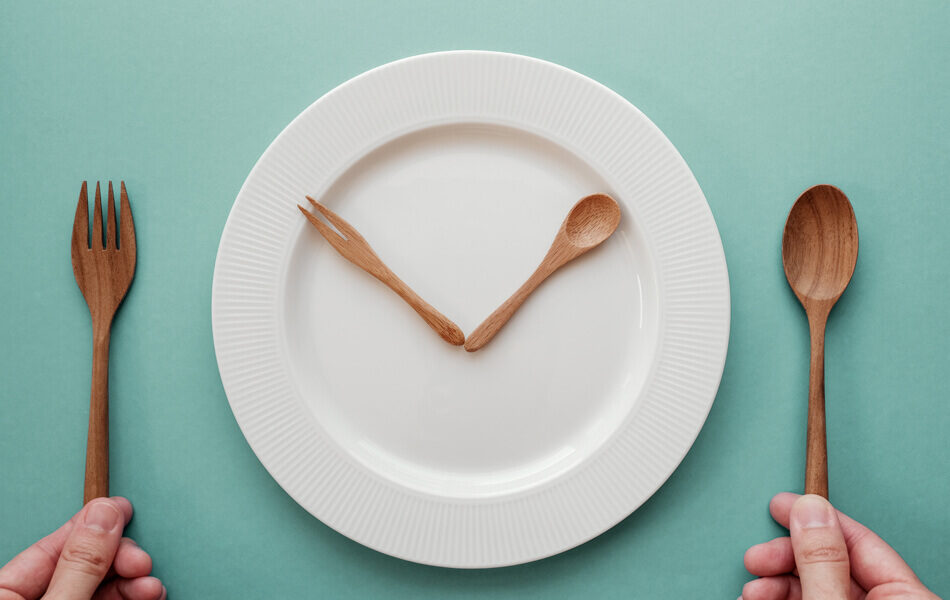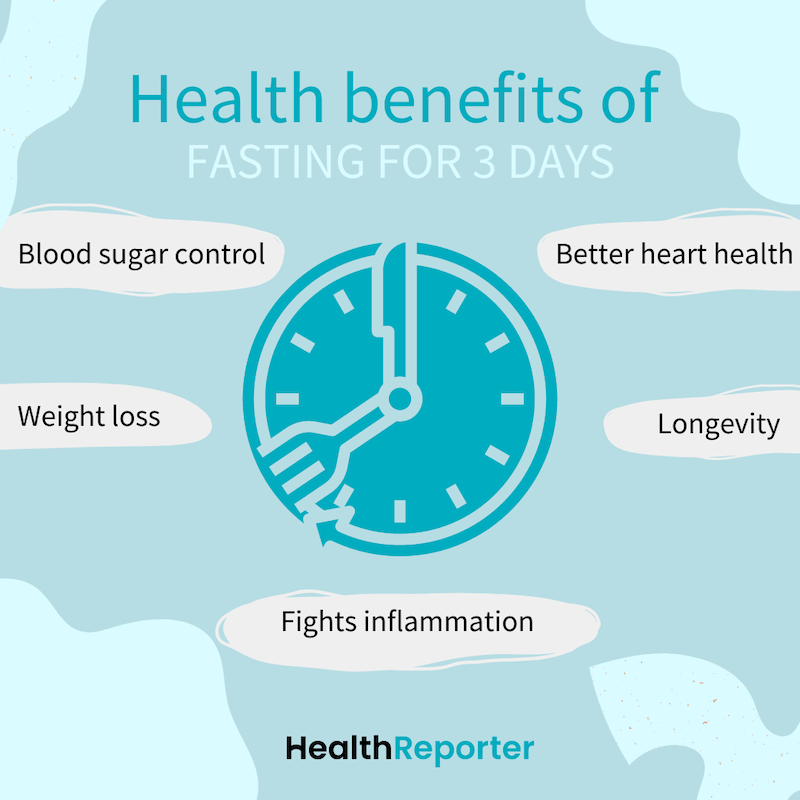3-Day Fast Guide: What You Must Know
Fasting for 72 hours might sound like a serious challenge. However, with the right preparation and a few tricks, it is not that hard. Read our 3-day fasting guide to learn what are the benefits of this fasting method, is it safe, and how often should you fast.

Fasting for 3 days might sound like an intense exercise, but it’s actually much more attainable than one might first think.
There are also many benefits that come from a fasting journey like this. We’ve consulted with fasting experts to explain how to safely participate in a 3-day fast and what to expect.
How to Prepare for a 3-Day Fast
When it comes to a 3-day fast, you don’t want to jump into it unprepared. Before starting your fasting journey, you want to prepare for at least a week in advance, but even more is preferred.
Experts recommend eating a keto diet for several days to a week before you enter into your fasting period.
A keto diet encourages your body to enter into a state of ketosis, which encourages your body to search for energy in places other than carbohydrates.
When your body is already used to using stored fat and turning it into energy, you’ll feel much less fatigued during your 3-day fast.
Before fasting, make sure you’re eating healthy fats, high-fiber, and whole foods. These will give your body the energy it needs to make it through the 3 days with little to no adverse effects, as well as help your body fight off hunger pangs.
You want to make sure you know exactly what you can have during your 3-day fast. Drinking water, black coffee, and tea are all good ways to help your body stay hydrated and alert during your fast. You also have to be well-hydrated before going into your fast, so drink plenty of water.
Health Benefits of Fasting for 3 Days
People don’t just do fasting for 3 days for the fun of it. There are many benefits that come from such an intense period of fasting.

#1 Blood sugar control
Intermittent fasting in itself is great for your blood sugar, but a 3-day fast will definitely help you get better control of it.
Type 2 diabetes is very common for people who have too much sugar in their diet. A fast will allow your body to use up all that sugar and lower the risk of diabetic symptoms.
#2 Fights inflammation
Inflammation can lead to a number of different issues: some cancers, heart disease, PCOS, and even problems with your immune system.
Fasting for 3 days allows your body to rest, which can get rid of inflammation by lowering the monocytes in the blood.
#3 May enhance heart health
With the help of a 3-day fast, the reduction of inflammation helps with heart disease prevention and lowers the levels of bad cholesterol in your body.
Some studies show that people who fast, even if it’s not for 3 days, have a greatly reduced risk of heart failure and can lower their blood pressure.
#4 Helps you lose weight
For many people, the idea of weight loss is one of the main reasons to go on a fast.
Fasting for 3 days helps put your body into ketosis, which encourages burning fat and helps people lose weight. It also helps your body enter into a calorie deficit, promoting weight loss.
#5 Promotes longevity
Fasting for 3 days encourages your body to enter into a state known as autophagy.
Autophagy is when your body reduces and recycles old, damaged, and dying cells. These cells are then regenerated in the body. While the body automatically uses autophagy, fasting speeds up the processes, promoting cell regeneration.
How to Do a 3-Day Intermittent Fasting
Before you dive into fasting for 3 days, it’s important to know the possible drawbacks.
There are several common side effects of prolonged fasting, such as dizziness, weakness, fatigue, exhaustion, headaches, low blood sugar, and even muscle aches.
If you’re not careful, you can do a lot of damage when fasting for such a long period of time, especially if you’re going from a normal diet right into fasting. Before starting an extended fast, it’s important to have a foundation with fasting, so your body knows what to expect.
During your fast, you can drink coffee without any sugar or cream, as well as things like bone broth, green or herbal teas, and water.
Water is one of the most important things to have while fasting for 3 days. You need to make sure your fluid and electrolyte levels are kept up.
If you’re not a fan of coffee or tea, you can always turn your fast into a 3-day water fast.
Water fasting is when you only drink water for the entirety of your fasting period. Water fasting is good for gut health and the digestive system and helps reduce water weight.
While light exercise is probably okay during your fast, your body is already going to be burning enough energy without doing anything.
Take this time to rest and let your body burn away body fat without having to do any vigorous exercise.
How Often Should You Do a 3-Day Fast for Weight Loss?
For most people, fasting for 3 days once a month is exactly what they need to get the advantages from fasting. Outside of that period, intermittent fasting or a keto diet might be just the ticket. For others, a period of 3 days of fasting or water fasting every two weeks can help with weight loss goals.
How often you can fast for 3 days at a time depends on a number of factors, including your health, your diet, how much weight you’re looking to lose, and what you’re hoping to achieve with your diet.
You may also want to consider your mental health, as fasting for extended periods can be detrimental to people who are susceptible to eating disorders.
Is Fasting for 3 Days Healthy?
If you’re familiar with fasting, eat a healthy diet, and have the okay from your doctor, then fasting for 3 days shouldn’t cause that much trouble.
However, fasting for long periods can have health risks. If you’re prone to or recovering from an eating disorder, fasting for this length of time could cause a relapse.
Any amount of fasting has the potential to be good for the human body. 3-day fasts can help with chronic diseases, mental clarity, insulin production, and encouraging your body to recycle immune cells.
Without proper medical supervision, fasting like this can also cause muscle loss, stomach pain, and other health issues.
It’s important to know your mind and body before you take the plunge into a fast like this.
Breastfeeding women shouldn’t mess with their caloric intake or food intake, as their bodies need all the nutrients they can get to feed the baby. Pregnant women should also not partake in fasting.
What to Eat After Fasting for 3 Days?
After your fast, it’s important to take care of your gut health. A light meal after breaking your fast is best. Something like soup or a smoothie, fruits and vegetables, or even fermented foods like yogurt are best for your body.
It might be tempting to have your first meal be something with a lot of calories. When you feel hungry, it’s harder to make good decisions about food. That’s why you should go in prepared.
After your first day back eating, you can enjoy all of the delicious food that you’ve certainly missed. These light foods can help your body ease back into eating and will help you with your bowel movements after breaking your fast.
A Word From Dietitian
Many people have heard of alternate-day fasting, where you spend 24 hours with only water or maybe some tea and coffee while avoiding calories and hard foods. But this 3-day fast takes intermittent fasting to a whole new level.
Fasting can help with burning glucose, chronic disease, fat burning, insulin resistance, and a whole host of other benefits. Especially if you’re looking to lose weight, you’ll be surprised at how amazing your body feels after something like a 3-day water fast.
While you might miss eating, you’ll feel like a million bucks once you get to the other side!
Conclusion
A 3-day fast is definitely not for the faint of heart – literally!
When looking to go through extended fasts, you want to make sure that you’re doing so safely.
There are plenty of benefits for a fast like this, but there are also some drawbacks. It’s okay if you’re not capable of finishing this fast your first time through!
Make sure you have a good foundation with fasting before taking on a fast like this. Talk to your doctor about the health benefits and the potential risks, and make a decision that works best for you and your body.

















































 Select your language:
Select your language: 








